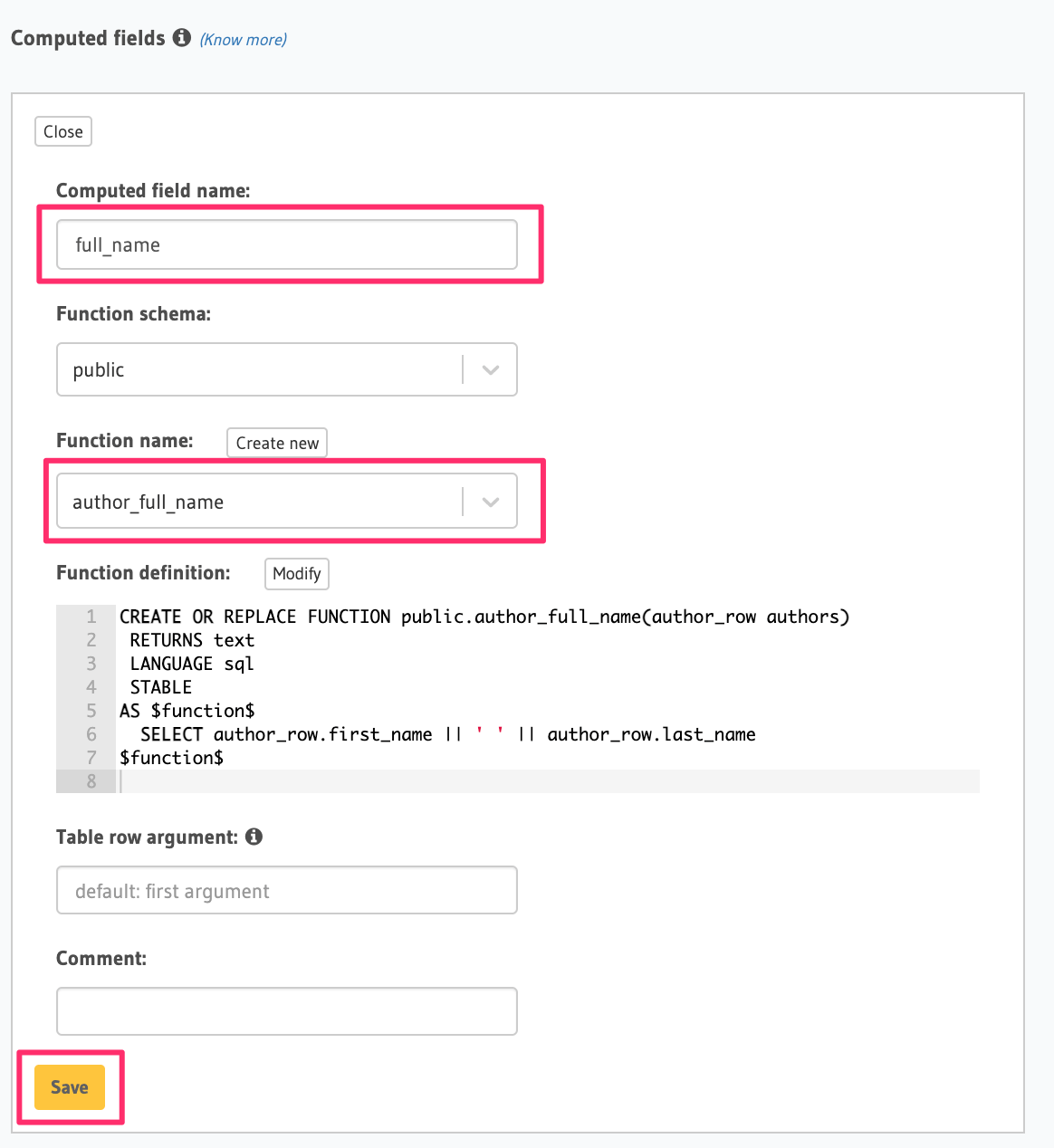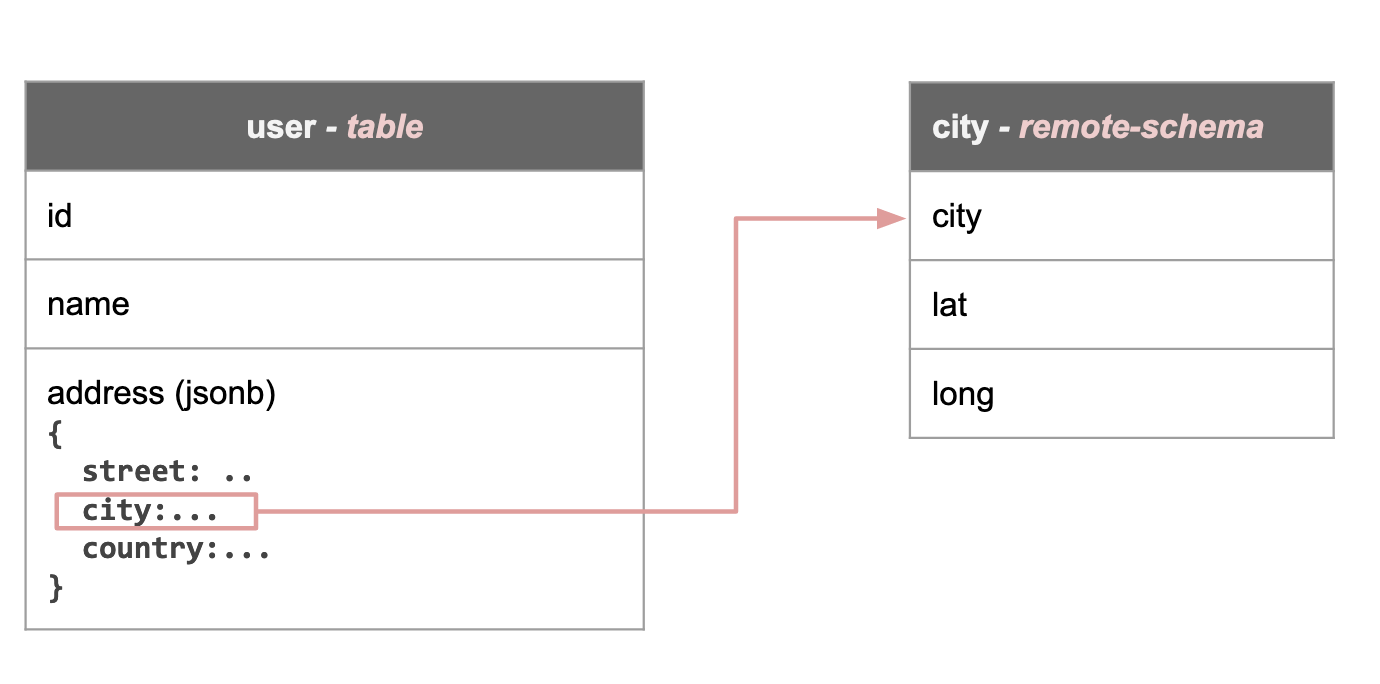Postgres: Computed fields
What are computed fields?
Computed fields are virtual values or objects that are dynamically computed and can be queried along with a table/view's columns. Computed fields are computed upon request. They are computed by executing custom SQL functions (a.k.a. stored procedures) using other columns of the table/view and other custom inputs if needed.
Computed fields are only exposed over the GraphQL API and the database schema is not modified on addition of a computed field.
Supported SQL functions
Only functions which satisfy the following constraints can be added as a computed field to a table/view. (terminology from Postgres docs):
- Function behaviour: ONLY
STABLEorIMMUTABLE - Argument modes: ONLY
IN - Table Argument: One input argument with a table row type
- Return type: Either
SETOF <table-name>orBASEtype
Functions used as computed fields can also accept other arguments other than the mandatory table row argument. Values for these extra arguments can be passed as arguments to the computed field in the GraphQL API.
Computed field types
Based on the SQL function's return type, we can define two types of computed fields:
1. Scalar computed fields
Computed fields whose associated SQL function returns a base type like Integer, Boolean, Geography etc. are scalar computed fields.
Example:
Let's say we have the following schema:
authors(id integer, first_name text, last_name text)
Define an SQL function called author_full_name:
CREATE FUNCTION author_full_name(author_row authors)
RETURNS TEXT AS $$
SELECT author_row.first_name || ' ' || author_row.last_name
$$ LANGUAGE sql STABLE;
Add a computed field called full_name to the authors table using the SQL function
above.
Query data from the authors table:
2. Table computed fields
Computed fields whose associated SQL function returns SETOF <table-name> are table computed fields. The return table
must be tracked to define such a computed field.
Example:
Let's say we have the following schema:
authors(id integer, first_name text, last_name text)
articles(id integer, title text, content text, author_id integer)
Now we can define a table relationship on the authors table to fetch
authors along with their articles.
We can make use of computed fields to fetch the author's articles with a search parameter.
Define an SQL function called filter_author_articles:
CREATE FUNCTION filter_author_articles(author_row authors, search text)
RETURNS SETOF articles AS $$
SELECT *
FROM articles
WHERE
( title ilike ('%' || search || '%')
OR content ilike ('%' || search || '%')
) AND author_id = author_row.id
$$ LANGUAGE sql STABLE;
Add a computed field called filtered_articles to the authors table using the SQL
function above.
Query data from the authors table:
Adding a computed field to a table/view
- Console
- CLI
- API
Head to the Modify tab of the table/view and click on the Add button in the Computed fields section:

- Console support for tables is available in
v1.1.0and above - Console support for views is available in
v1.3.0and above
You can add a computed field by updating the metadata > databases > [db-name] > tables > [table_name].yaml file:
- table:
schema: public
name: authors
computed_fields:
- name: full_name
definition:
function:
schema: public
name: author_full_name
table_argument: null
comment: ''
Apply the metadata by running:
hasura metadata apply
A computed field can be added to a table/view using the pg_add_computed_field metadata API:
POST /v1/metadata HTTP/1.1
Content-Type: application/json
X-Hasura-Role: admin
{
"type": "pg_add_computed_field",
"args": {
"source": "<db_name>",
"table": {
"name": "authors",
"schema": "public"
},
"name": "full_name",
"definition": {
"function": {
"name": "author_full_name",
"schema": "public"
},
"table_argument": "author_row"
}
}
}
Computed fields permissions
Access control to computed fields depends on the type of computed field.
- For scalar computed fields, permissions are managed similar to the columns permissions of the table.
- For table computed fields, the permissions set on the return table are respected.
Accessing Hasura session variables in computed fields
It can be useful to have access to the session variable from the SQL function defining a computed field. For instance,
suppose we want to record which users have liked which articles. We can do so using a table article_likes that
specifies a many-to-many relationship between articles and users. In such a case it can be useful to know if the
current user has liked a specific article, and this information can be exposed as a Boolean computed field on
articles.
Create a function with an argument for session variables and add it with the
pg_add_computed_field API with the
session_argument key set. The session argument is a JSON object where keys are session variable names (in lower case)
and values are strings. Use the ->> JSON operator to fetch the value of a session variable as shown in the following
example.
-- 'hasura_session' will be the session argument
CREATE OR REPLACE FUNCTION article_liked_by_user(article_row articles, hasura_session json)
RETURNS boolean AS $$
SELECT EXISTS (
SELECT 1
FROM article_likes A
WHERE A.user_id = hasura_session ->> 'x-hasura-user-id' AND A.article_id = article_row.id
);
$$ LANGUAGE sql STABLE;
POST /v1/metadata HTTP/1.1
Content-Type: application/json
X-Hasura-Role: admin
{
"type":"pg_add_computed_field",
"args":{
"source": "<db_name>",
"table":{
"name":"articles",
"schema":"public"
},
"name":"liked_by_user",
"definition":{
"function":{
"name":"article_liked_by_user",
"schema":"public"
},
"table_argument":"article_row",
"session_argument":"hasura_session"
}
}
}
The specified session argument is not included in the argument options of the computed field in the GraphQL schema.
This feature is available in v1.3.0 and above
Computed fields vs. Postgres generated columns
Postgres, from version 12, is introducing
Generated Columns. The value of generated columns is
also computed from other columns of a table. Postgres' generated columns come with their own limitations. Hasura's
computed fields are defined via an SQL function, which allows users to define any complex business logic in a function.
Generated columns will go together with computed fields where Hasura treats generated columns as normal Postgres
columns.
Computed fields in Remote Relationships
Using computed fields in Remote Relationships allows transformation
of data from table columns before joining with data from remote sources. For instance, suppose we want to extract
certain field from a json column and join it with a field in a remote schema by argument value. We would define a
computed field which returns a scalar type of the field value in the json column and use it to join the graphql field
of the remote schema. Consider the following Postgres schema.

CREATE TABLE "user" (id SERIAL PRIMARY KEY, name TEXT UNIQUE NOT NULL, address json NOT NULL);
-- SQL function returns city of a "user" using "->>" json operator
CREATE FUNCTION get_city(table_row "user")
RETURNS TEXT AS $$
SELECT table_row.address ->> 'city'
$$ LANGUAGE sql STABLE;
Now, let's track the table and add computed field user_city using the SQL function get_city. Consider the following
remote schema.
type Query {
get_coordinates(city: String): Coordinates
}
type Coordinates {
lat: Float
long: Float
}
Define a remote relationship
with name user_location from user_city scalar computed field to get_coordinates remote schema field. We can query
users with the pincode of their residing place.
Only Scalar computed fields are allowed to join fields from remote sources
This feature is available in v2.0.1 and above

